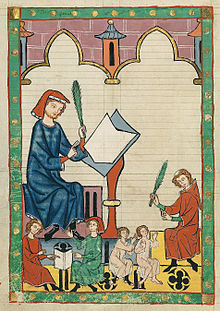
A catechism ( /ˈkætəˌkɪzəm/; from Ancient Greek: κατηχέω, "to teach orally") is a summary or exposition of doctrine and serves as a learning introduction to the Sacraments traditionally used in catechesis, or Christian religious teaching of children and adult converts.[1] Catechisms are doctrinal manuals – often in the form of questions followed by answers to be memorised – a format that has been used in non-religious or secular contexts as well. According to Norman DeWitt, the early Christians appropriated this practice from the Epicureans, a school whose founder Epicurus had instructed to keep summaries of the teachings for easy learning.[2] The term catechumen refers to the designated recipient of the catechetical work or instruction. In the Catholic Church, catechumens are those who are preparing to receive the Sacrament of Baptism. Traditionally, they would be placed separately during Holy Mass from those who had been baptized, and would be dismissed from the liturgical assembly before the Profession of Faith (Nicene Creed) and General Intercessions (Prayers of the Faithful).[citation needed]
Catechisms are characteristic of Western Christianity but are also present in Eastern Christianity.[3] In 1973, The Common Catechism, the first joint catechism of Catholics and Protestants, was published by theologians of the major Western Christian traditions, as a result of extensive ecumenical dialogue.[4]
- ^ Katecheo Archived 25 August 2011 at Wikiwix[full citation needed] – Strong's Concordance
- ^ St Paul and Epicurus. Minnesota Archive Editions. January 1954. ISBN 0816657467.
- ^ "The Longer Catechism of The Orthodox, Catholic, Eastern Church". www.pravoslavieto.com. Retrieved 14 April 2022.
- ^ Commonweal, Volume 102. Commonweal Publishing Corporation. 1975. p. 31.
The book offers the first comprehensive statement of religious faith produced jointly by Catholic and Protestant theologians since the separation of the churches over four centuries ago.